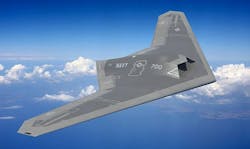Strike or surveillance: GAO says Navy needs to settle on role of future combat drone
WASHINGTON, 6 May 2015. The role of a future U.S. Navy aircraft carrier-based combat drone remains unclear, which leaves Navy leaders uncertain of the program's long-term costs, congressional investigators have found.
Navy leaders have not settled on whether the future Unmanned Carrier-Launched Airborne Surveillance and Strike (UCLASS) unmanned aerial vehicle (UAV) system will be for surveillance with limited strike in lightly contested environments, or for strike with limited surveillance in highly contested environments, The U.S. General Accountability Office (GAO) reported this week.
This lack of resolution on the UCLASS unmanned aircraft program's future leaves Navy leaders with no clear idea on how much the program will cost over the long term, and no clear idea how to proceed with development, GAO investigators say.
The UCLASS unmanned aircraft is being designed to take off and land from deployed Navy aircraft carriers, as well as refuel in flight. Four companies are coming up with preliminary UCLASS designs: the Boeing Co. Defense, Space & Security segment in St. Louis; the Lockheed Martin Corp. Skunk Works in Palmdale, Calif.; General Atomics Aeronautical Systems Inc. in Poway, Calif.; and the Northrop Grumman Corp. Aerospace Systems segment in Redondo Beach, Calif.
GAO officials outlined their findings in a report released Monday entitled Unmanned Carrier-Based Aircraft System: Navy Needs to Demonstrate Match between Its Requirements and Available Resources. The GAO, headquartered in Washington, is the investigative arm of Congress, and reports to Congress each year on the UCLASS program's progress.
Related: Congress wants Navy to beef-up offensive strike capabilities of UCLASS unmanned aircraft
"Congress has raised concerns about whether UCLASS will be armed and survivable enough to support U.S. power projection in areas in which access and freedom to operate are challenged," the report states, pointing out concerns about the UCLASS ability to help counter enemy defenses.
"The resolution of the debate over UCLASS requirements could have significant design and cost implications, which will determine the resources the Navy needs and how much knowledge from the Navy’s previous assessments and estimates can still be applied," the GAO report says.
Early operational UCLASS capability is not expected before 2022, and could occur as late as 2023, GAO investigators say. This delay leaves the Navy without a viable business case to move the program forward, GAO officials say.
"If the final UCLASS requirements emphasize a strike role with limited surveillance, the Navy will likely need to revisit its understanding of available resources in the areas of design knowledge, funding, and technologies before awarding an air system development contract," the report says.
Related: Navy gets wheels in motion to start official competition to build carrier-based combat UAV
Navy leaders expect to have spent at least $3 billion on UCLASS development through 2020 in the development of UCLASS to enhance the intelligence, surveillance, reconnaissance, targeting, and strike capabilities of the Navy's aircraft carrier fleet.
In August 2013, the Navy awarded contracts worth $15 million each to the four competing contractors to develop preliminary designs for the air system, which were assessed by the Navy in May 2014. A development contract is expected in 2017, and the first UCLASS-equipped aircraft carrier is expected to deploy in 2022.
The full GAO UCLASS report is online in .pdf form at www.gao.gov/assets/680/670010.pdf. For more information contact the GAO online at www.gao.gov, or Naval Air Systems Command at www.navair.navy.mil.

